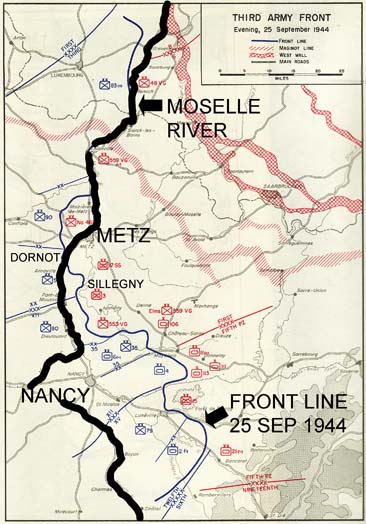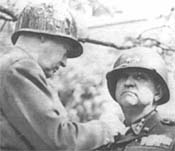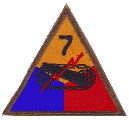|
The cost of the siege of Metz was staggeringly high. 7AD paid much of that cost. C/38 ran into the strongest defense of the line 6 Sep 1944 and suffered their worst day of the entire war, worse even than the later battles at Overloon, Meijel or St. Vith. 23 AIB lost its CO and many men in the futile Dornot bridgehead across the Moselle River. 38 AIB lost five Battalion commanders in one day; historian Anthony Kemp wrote: “The day on which [38AIB] would win glory was 19 September, but it ceased to be a fighting force in the process.” And there were far more losses – all in the attempt to take Metz.
Third Army historian Paul Harkins noted that Third Army Commanding General George Patton later admitted error in “his insistence upon directly assaulting instead of bypassing Metz.” But on 23 Aug, with Metz still in the future, Patton wrote: “… General Juin … said … the easiest way through the Siegfried Line was the Nancy Gap. I had come to this same conclusion from a study of the map …”
Certainly this was the most logical conclusion, which meant concentrating forces well south of Metz at Nancy and then pushing through and bypassing Metz.
Even on the 9th day, 15 Sep, of the attack on Metz (which Patton had predicted would fall in 10 days) Patton wrote: “… I planned that … I would give [XII Corps, in the Nancy Gap] the 7th Armored and let the XX Corps … contain Metz while the XII Corps … would drive through to the Rhine.” And yet he did not do this.

Click on image for full size.
Thus Patton saw with foresight, with hindsight and in the midst of the battle what the right course was, but he did not do it. Instead, he allowed XX Corps Commanding General Walton Walker to directly attack Metz, which completely undermined the entire Third Army drive to the German Westwall. What led Patton to make such a serious and costly error, when he clearly saw the right course of action?
We may never really know the answer. But after considering it for many years, I believe I have an answer that makes sense, more sense than any of the other answers that have been proposed.
Let’s first examine three of those other ideas, summarized by historian John Nelson Rickard: “… [Patton] did not fully appreciate the drastic change in terrain, and he completely misread the ability of the German army to stand and fight.” And “He pressed the Moselle too thinly.”
The terrain at the Moselle was indeed radically different from anything Third Army had encountered in France, not at all suitable for armor, especially when the steep roads turned to mud in September rains. The terrain was ideal for defense, and the Germans did not need much preparation. (A fourth idea is that Third Army running out of gas at Verdun allowed the Germans to set up their defenses. Captured German documents do support this to a limited extent, but ultimately it was the terrain that allowed even minimal German defensive efforts to be highly successful.)

Click on image for full size.
As the German army fell back in retreat, their supply lines became shorter. The Westwall (Siegfired Line) and reinforcements became closer. The Germans were more able to fight. In fact, they saw Metz as German territory, since Germany had annexed it in 1940. So they were more willing to fight for their homeland.
The broad front Patton actually used, due to the slogging effort at Metz, never successfully concentrated forces and thus never penetrated the German lines to any significant extent.
So Rickard is correct in his assessment of the impact of the terrain, the true state of the German army, and Patton’s wide front. And yet these still do not explain why Patton did not bypass Metz and concentrate his forces at Nancy, as he saw was the right thing to do. So we come again to the question: why did Patton not do what he knew was right?
Patton was an extremely scholarly military historian. He was bold and decisive. But his decisiveness was like the repairman who knows through prior learning just where to fix the machine. Patton read heavily in military history between the wars. He learned from others’ experiences. His reading also gave him a sense of the unique historic importance of the places where he later fought.
So Patton knew Metz had never been captured since the Huns took it in 451. Metz was the most heavily fortified city in the world. And of course, this was all the more reason for Patton to have concluded to bypass it.
And yet it is that very fact that it had never been captured in almost 1,500 years that I think was the core of either Patton or Walker’s desire. They wanted to go down in history as the first to capture Metz since 451. I have not found solid documentation of this, but it certainly was very much touted after Metz finally fell (in 3 months and not the 10 days Patton predicted). So it was clearly in their awareness at the time.
Patton gave Walker an extremely long leash to try to take Metz in September. He did not even visit Walker’s XX Corps until the tenth day of the campaign (16 Sep, recall his 10-day forecast). And even then, as 4AD and XII Corps were making a crucial breakthrough in the area of the Nancy Gap and Patton really wanted to move 7AD to XII Corps, he still gave Walker more leash and allowed Walker to keep 7AD.

Click on image for full size.
On 20 Sep, he saw once again what needed to be done and wrote: “It was on this day that I definitely decided not to waste time capturing Metz, but to contain it with as few troops as possible and drive for the Rhine.” But, by then, he was too late. 7AD was taken away from him and sent north to Holland. And the entire Third Army front stalled, primarily due to all the resources wasted trying to capture Metz.
Though we will probably never know if this is correct, I believe either Patton or Walker or both wanted the accolade of being the first to capture Metz since 451. I think it is more likely that it was Walker and that Patton was inclined to indulge his “bulldog” this favor, despite knowing that the correct decision was to bypass Metz. Patton probably had a soft spot for Walker on this, since if the roles were reversed Patton would likely have wanted to be allowed to capture Metz.
Patton had not counted on losing 7AD. He thought he had more options than he really did. The result is that Patton’s “incorrect employment of the 7th Armored Division” (Rickard) in assaulting Metz was the crucial element in the failure of Third Army’s September offensive.
~ Wesley Johnston
|

